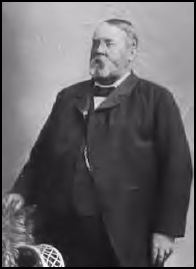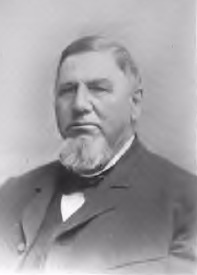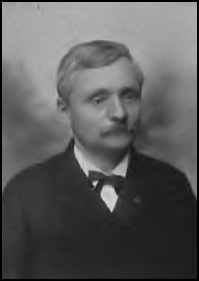|
Progressive Men of Iowa
1899
 DAVIS,
Mahlon James, M. D., of Lewis, Cass county, is
one of those fortunate individuals who, by a
peculiar combination of qualities, rapidly
accumulates fast friends. His service in the
legislature and his activity in politics has
given him a statewide acquaintance, and wherever
he has become known the genial doctor is very
popular, for he always has a pleasant word for
his acquaintances and is always cheerful and
never loses his temper. DAVIS,
Mahlon James, M. D., of Lewis, Cass county, is
one of those fortunate individuals who, by a
peculiar combination of qualities, rapidly
accumulates fast friends. His service in the
legislature and his activity in politics has
given him a statewide acquaintance, and wherever
he has become known the genial doctor is very
popular, for he always has a pleasant word for
his acquaintances and is always cheerful and
never loses his temper.
He was born in
Juniata county, Pa., October 17, 1837, and was
the son of Judah Davis and Charlotte Lease
Davis. The family lived on a farm and was in
fair circumstances. Mr. Davis was of Welsh
descent and his wife of German parentage. They
gave their son a good education, in the Airy
View academy and Kishacoquilla seminary, both in
Pennsylvania. Then be graduated from the medical
department of the University of New York, in
March, 1862, and in the following July was
appointed an acting assistant surgeon in the
United States regular army. In the following
year he was appointed by the governor of New
York assistant surgeon of the Second New York
heavy artillery, with which he served until near
the close of the war, when he was appointed
surgeon of the Two Hundred and Fourth New York
Volunteer infantry, but as the war closed before
he could be mustered in, he never joined the
regiment. From July 6, 1864, until the surrender
at Appomattox he served as surgeon-in-chief of
the artillery brigade of the Second corps on the
staff of General Hazard, chief of artillery of
that corps.
When the war closed,
Dr. Davis, in 1860, came to Iowa and located in
Lewis, his present residence, where he combined
the practice of medicine with the drug business,
with notable success in both. For two years,
1873 to 1875, he had a partner, Dr. D. Findley,
now of Atlantic. He served as examining surgeon
for pensions from 1874 to 1878. In 1880 Dr.
Davis retired from the practice of medicine to
devote all his attention to the drug business,
which he still
continues.
Dr. Davis has always
been a republican and an active party worker,
several years chairman of the republican county
committee. He was appointed postmaster of Lewis
by President Grant in 1869, and held the office
until 1886. He was elected member of the house
of representatives in 1893 and 1895, serving as
chairman of the committee on pharmacy in the
Twenty-fifth and Twenty-sixth General
Assemblies, in 1894 and 1896, and in the extra
session of 1897. He was the author of the law
prohibiting registered pharmacists from selling
malt liquors, and of several other bills in
relation to the practice of pharmacy. Besides,
he was alive to the general interests of the
state and was a working member on many important
committees. The
doctor is a member of the Masonic order and was
master of Lewis lodge for four years, and for
five or six years a delegate to the Grand Lodge
of Iowa.
He was married
December 27, 1864, to Priscilla K. Shuman,
in Harrisburg, Pa. They have three sons, the
eldest of whom, W. B. Davis,
is associated with his father as partner in the
drug business. The second son, B. B. Davis is a
practicing lawyer in Chicago, and the youngest
son, Charles P. Davis, is at this time, 1898,
studying law in the University of Michigan, in
Ann Arbor. With a comfortable fortune, friends
everywhere he goes, and a happy and well-to-do
family, Dr. Davis is now enjoying the results of
a well-directed period of
activity.
 MILLS,
Oliver, of Lewis, Cass county has been for
nearly fifty years a resident of Iowa, and
through his connection with the State
Agricultural society, which lasted for about
twenty years, became well known to the people of
our state. For three successive terms he served
as president of the society, and was for many
years a director and one who took a leading part
in building up the society and making it a
success. He, like many others of our prominent
citizens, is a native of Ohio, born at Gustavus,
Trumbull county, February 1, 1820. This village
is situated in north-eastern Ohio, about fifty
miles east of Cleveland and almost in sight of
the beautiful Lake Erie. MILLS,
Oliver, of Lewis, Cass county has been for
nearly fifty years a resident of Iowa, and
through his connection with the State
Agricultural society, which lasted for about
twenty years, became well known to the people of
our state. For three successive terms he served
as president of the society, and was for many
years a director and one who took a leading part
in building up the society and making it a
success. He, like many others of our prominent
citizens, is a native of Ohio, born at Gustavus,
Trumbull county, February 1, 1820. This village
is situated in north-eastern Ohio, about fifty
miles east of Cleveland and almost in sight of
the beautiful Lake Erie.
Harlow Mills, the
father of Oliver, was of pure New England stock
and a native of Hartford county, Conn. He was a
prosperous farmer and dairyman and married Faith
Ann Spencer, also a native of that county, but
of German descent. In 1819 they emigrated to
what was then the wild west and located in
northeastern Ohio. In this
beautiful lake region, known then as the western
reserve, Oliver was born and grew to manhood.
He attended the
district schools in that locality, which were
then excellent, until he was 14, when he went to
Farmington academy to finish his education. When old
enough to start out for himself he engaged in
farming and stock raising, in which he was very
successful. April 17, 1839, he married Sophia
Arnold. Attracted by the fame of the wonderful
prairie west of the Mississippi, in 1850 he
removed his young family to Lee county, Iowa,
and settled at Denmark. Since that date he has
been active in building up the industries of the
new state and has managed his own business with
a sagacity which has enabled him to accumulate a
competence. After
residing at Denmark nearly eight years he
removed to Lewis, Cass county, in 1857; at that
time almost all of the country west of Des
Moines was a prairie wilderness. It is now,
1899, a thickly settled and most beautifully
improved country. Mr. Mills still resides at
Lewis, at the age of 78 years, with mind as
bright and clear as ever, with interest unabated
in state and
nation.
Mr. Mills was
originally a whig, but since the organization of
the party has been an active and influential
republican He has held several minor offices and
was a member of the Fourteenth General Assembly,
representing Cass, Montgomery and Adair
counties, then forming the Twentieth
representative district. Since
the early age of 14, Mr. Mills has been a member
of the Congregational church. He has always
practiced and advocated the strictest
temperance. Mr. Mills
has six children: John A. born March 9, 1840;
Edward P., born August 25, 1841; N. L., born
March 25, 1846; Sophia, born April
21, 1849; George S., born June 1, 1852, and
Franklin O., born June 1, 1854. His first wife
died in 1876 and April 25, 1877, he married
Julia A.
Forgy.
 PHELPS, Hon. Julian, who
represented the Cass and Shelby senatorial
district in the general assembly, and author of
the anti-cigarette law enacted by the
legislature, in 1896 and 1897, resides at
Atlantic in his beautiful suburban home known as
"The Oaks." He was born at South Hero, Grand
Island county, Vt., April 4, 1838. His father,
William Phelps, was a farmer and the owner of a
large tract of valuable land near Milton, Vt. He
was one of the prominent men of his town and
county, and was especially active in all
educational affairs. He died some years ago. The
mother was born on Grand Island, in Lake
Champlain, and is still living at Milton, Vt.,
at the age of 82. Her
mother's name was Stark, a near relative of
General Stark, of revolutionary
fame. PHELPS, Hon. Julian, who
represented the Cass and Shelby senatorial
district in the general assembly, and author of
the anti-cigarette law enacted by the
legislature, in 1896 and 1897, resides at
Atlantic in his beautiful suburban home known as
"The Oaks." He was born at South Hero, Grand
Island county, Vt., April 4, 1838. His father,
William Phelps, was a farmer and the owner of a
large tract of valuable land near Milton, Vt. He
was one of the prominent men of his town and
county, and was especially active in all
educational affairs. He died some years ago. The
mother was born on Grand Island, in Lake
Champlain, and is still living at Milton, Vt.,
at the age of 82. Her
mother's name was Stark, a near relative of
General Stark, of revolutionary
fame.
Julian Phelps was
fitted for college in an academy at South Hero,
under the instruction of Rev. O. G. Wheeler, a
man of great intellectual attainments and
remarkable force of character. He exerted a
wonderful influence over his pupils, moral and
intellectual. In the fall of 1860 he entered the
University of Vermont, and there pursued his
studies until early in the spring of 1864, when
he enlisted in the union army. The university,
like most of the colleges, permitted those
students who enlisted during their senior year
to graduate with their class. Mr. Phelps was
wounded in the battle of Cold Harbor, and was
sent to the hospital at Burlington, Vt., where,
through skillful treatment, his wound healed
rapidly, and he was able to graduate with his
class in June, 1864. delivering his oration in
uniform and supporting himself on the platform
with a cane. He then returned to the front, and
served with his regiment to the close of the
war, after which he commenced the study of law
in the office of Hon. Daniel Roberts, of
Burlington, who was associated with Senator
Edmunds in much of his law business. He had
enlisted in the Eleventh Vermont infantry at
Washington, D. C., and was in the battles of
Spottsylvania, Cold Harbor, Petersburg, and all
others under Grant and Sheridan until Lee's
surrender at Appomattox. He is a member of Sam
Rice Post, G. A. R., at
Atlantic.
In October, 1866, he
entered the Albany Law school, and graduated in
the summer of the following year William
McKinley, of Ohio, was in the senior class of
that institution at the time Mr. Phelps
matriculated. After graduation he came to Iowa,
and located at Lewis, in Cass county, where he
formed a partnership with Judge Henry Temple.
Lewis was then a small town and the county seat,
but on the completion of the Rock Island
railroad the capital was removed to Atlantic,
and the firm of Temple & Phelps followed
shortly.
The relation existed until the fall of
1887, when Frank O. Temple, son of the senior
member, was admitted to partnership, and the
style became Temple, Phelps & Temple, and so
remained until the death of Judge Temple, a few
months thereafter, since which the firm has
continued as Phelps & Temple. They were
employed with Hon. Thomas
F. Withrow, for B. F. Allen and other
plaintiffs, in the noted Atlantic townsite case,
involving the title to nearly all of the town of
Atlantic, which terminated in their favor at the
end of a stubbornly fought legal
battle.
He cast his first
vote for Lincoln, and has voted the republican
ticket since. He was elected to the state senate
in November, 1893, from the Eighteenth
senatorial district, and at the session of the
Twenty-sixth General Assembly introduced and
procured the passage of the bill known as the
"Bill for an act to prohibit the manufacture and
sale of cigarettes." He was among the foremost
senators in influence and ability, and was
prominent in the more important work of the
senate, both in the committee room and on the
floor. In 1897 Senator Phelps was appointed by
the president to be United States consul at
Crefield, Germany, and is now serving his
country abroad.
He is a member of the Congregational
church. He was married to Miss Mary A. Case in
1869, and she died the following year, leaving
an infant son, who died soon after. Mr. Phelps
later married a sister of his first wife, Percis
M. Case. Two children, a son and a daughter, are
now living. The daughter, Anna, is now the wife
of F. O. Temple, and the son, Will P. Phelps, is
in the law department of the Iowa State
university.
The information
on Trails to the Past © Copyright may be used in personal family history research, with source citation. The pages in entirety may not be duplicated for publication in any fashion without the permission of the owner. Commercial use of any material on this site is not permitted. Please respect the wishes of those who have contributed their time and efforts to make this free site possible.~Thank you! |